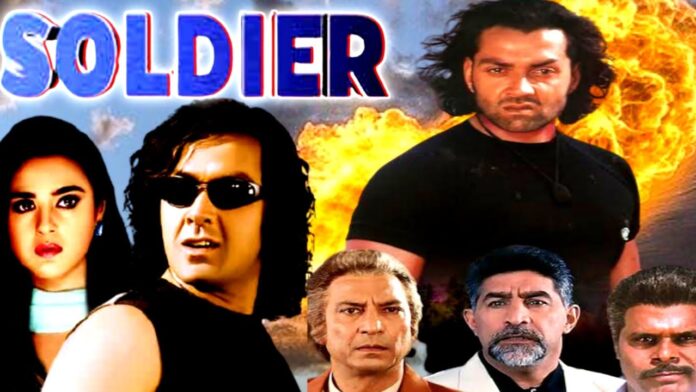SOLDIER
Tips Films’ Soldier (UA) is a suspense thriller. A conscientious army officer is killed by his colleagues who are traitors in the garb of armymen. Not only that, the murdered officer is also declared a traitor, thanks to the machinations of those who killed him for their personal gains at the cost of the country’s security. How a young lad comes close to the killers, befriends them and finally kills them one by one forms the latter part of the drama. Besides the suspense of the identity of the young lad, there’s also the suspense of the identity of one of the killers. But the suspense, when revealed, is not exciting as suspenses should be. While the revelation of the suspense about the boy’s identity does come as a surprise, that of the killer’s identity is neither surprising nor exciting.
The first half, after the prologue, is light, with emphasis on romance. The freshness in this portion is lent by the picturesque foreign locales and heroine Preity Zinta. Otherwise, there’s no novelty in content. In fact, Shyam Goel’s story is devoid of any freshness and depends a lot on clichéd situations. The ordinary story has, to a great extent, been salvaged by the huge canvas, beautiful locations and popular music. The post-interval portion has some good action as well as sentiments but lacks the flavour of the first half. Dialogues (Javed Siddiqi) are nice.
Bobby Deol does a fair job. He is very good in action though. Preity Zinta looks cute and comes up with a refreshing and lively performance. She also dances well. Dalip Tahhil is pretty impressive. Suresh Oberoi enacts his part effectively. Sharat Saxena is credible and also entertaining. Salim Ghouse is fair. Ashish Vidyarthi is reasonably good. Raakhee and Farida Jalal perform ably and provide the emotions. Pankaj Dheer leaves a mark. Jeetu Verma is alright. Johny Lever’s comedy is entertaining; actually, the mere presence of Johny Lever evokes laughter because of his first scene which is really enjoyable.
Abbas-Mustan have tried to give the film a very slick look and succeed in that but the lack of a worthwhile script to warrant the heavy expenditure is felt all along. The director duo could have done well to concentrate more on the story and screenplay. Anu Malik’s music is of the popular variety. The title song is a hit. ‘Tera rang balle balle’, ‘Mere khwabon mein jo aaye’ and ‘Mehfil mein baar baar’ are also very well-tuned. In fact, the songs come as cute interruptions in the drama. Song picturisations appeal more for the scenic locations on which they’ve been shot. They’ve been choreographed reasonably well. A song or two can, however, be deleted. Action scenes and thrills are beautifully composed. Thomas Xavier’s camerawork is splendid. Technically, of a good standard. Sets are vibrant. Production values are grand and a major plus point of the film.
On the whole, Soldier has hype, style, beautiful locales, racy songs and a fantastic initial value to offset the dull story and ordinary content. This suspense thriller will, therefore, prove an earning fare although it has less sustaining power. Its chances in North India are better.
Released on 20-11-’98 at Maratha Mandir, Metro (matinee) and 21 other cinemas of Bombay by Tips Films P. Ltd. thru R.G. International. Publicity: bumper. Opening: excellent. …….Also released all over. Opening was superb everywhere.
LATEST POSITION
The all-India bumper opening of SOLDIER this week has pleasantly surprised the trade.
Pardesi Babu has not done well in most of the circuits. 1st week Bombay 38,57,459 (69.08%) from 13 cinemas (11 on F.H.); Ahmedabad 5,81,765 from 5 cinemas (1 unrecd.), Vapi 2,42,186 (1 unrecd.), Jamnagar (matinee) 22,200 (1 in regular unrecd.); Pune 9,65,995 from 6 cinemas, Solapur 2,37,616 from 3 cinemas (1 in matinee); Delhi 40,43,568 (54.12%) from 15 cinemas (1 on F.H.); Kanpur 2,81,757 from 2 cinemas, Lucknow (6 days) 2,55,947, Agra 2,56,350, Allahabad 1,58,500; Amritsar 46,400; Calcutta 10,21,927 from 12 cinemas; Nagpur 3,89,940 from 4 cinemas, Dhule 1,00,052, Raipur (5 days) 97,291, Bhilai (6 days) 1,09,231; Indore 68,783 (4 on F.H.), Bhopal (6 days) 2,56,114 from 3 cinemas; Jaipur 7,06,499 from 4 cinemas; Hyderabad 22,81,648 from 14 cinemas (1 in noon), share 11,00,000.
Mehndi remains on the low side. 1st week Bombay 17,06,749 (61.76%) from 6 cinemas (5 on F.H.); Ahmedabad 1,11,537, Baroda 80,372, Rajkot (matinee) 12,430 (1 in regular unrecd.), Jamnagar 64,473 from 2 cinemas (1 in matinee); Pune 1,21,550, Solapur 43,616 from 2 cinemas (1 in matinee); Belgaum 78,346; Delhi 6,29,091 (35.01%) from 5 cinemas; Kanpur 1,10,467, Lucknow 68,957, Varanasi 81,203, Allahabad 45,000, Meerut 87,771, Bareilly 41,476 (18.55%); Amritsar 18,370; Calcutta 7,96,273 from 7 cinemas (8 on F.H.); Nagpur 1,40,025 from 2 cinemas, Amravati 1,23,628, Akola 57,094, Dhule 36,550, Raipur 75,009; Bhopal 89,076 from 2 cinemas; Jaipur 2,87,963 from 2 cinemas, Jodhpur 1,35,000.
Main Phir Aaoongi 1st week Bombay 53,758 (32.31%; 1 unrecd.); Delhi 3,58,343 (28.55%) from 3 cinemas; Kanpur 40,240; Bikaner 67,093.
Fire (dubbed) has done well in pockets only, but is poor at most of the places. 1st week Bombay 10,04,986 (99.13%) from 2 cinemas, English version 3,49,197 (100%) from 2 cinemas; Ahmedabad 1,93,506 from 2 cinemas, Baroda 60,241; Pune 3,03,698; Delhi 8,57,918 (62.43%) from 3 cinemas (1 on F.H.), English version 7,31,794 (64.19%) from 2 cinemas; Lucknow 1,23,047, Agra 78,431, Allahabad 70,202, Bareilly 36,830; Nagpur 1,39,698, Amravati 56,528, Akola 47,000; Hyderabad 2,51,496, English version 2,44,006.
Prem Aggan 3rd week Bombay 1,77,681 (20.95%); Pune 1,02,725 from 3 cinemas, Solapur 19,692; Delhi 1,20,697; Kanpur 75,436 from 2 cinemas, Lucknow 1,22,440, Agra 22,250, Allahabad 43,500, Bareilly (6 days) 11,860 (4.57%), Hardwar 9,719; Calcutta 79,505; Nagpur 33,517, Amravati 29,309; Hyderabad 2,00,865 from 2 cinemas (1 in noon).
Bade Miyan Chote Miyan 5th week Bombay 13,44,625 (76.95%) from 6 cinemas (7 on F.H.); Ahmedabad 2,12,046 from 2 cinemas (2 unrecd.), 1st week Padra 1,12,623, 5th week Jamnagar 56,623, total 4,72,516; Pune 5,63,123 from 5 cinemas, Kolhapur 1,06,086, Solapur 1,25,490, 1st week Barsi (gross) 90,000; Bijapur 1,70,000; 5th week Delhi 2,56,062 from 2 cinemas (2 on F.H.); Kanpur 2,01,259 from 2 cinemas, Lucknow 3,28,225, Varanasi 1,16,702, Allahabad 88,000, Meerut (6 days) 1,39,740, Bareilly (6 days) 29,241 (16.95%), 1st week Hardwar 1,27,649; 5th week Rohtak 13,212; Calcutta 1,45,917; Nagpur 1,47,605 from 2 cinemas, 4th week Amravati 1,39,503, Akola 1,06,422, Raipur 66,510, Bhilai 33,300, Durg 42,034, Jalgaon 88,598, Wardha 35,586, Chandrapur 94,407, total 6,73,778; 5th week Indore 1,66,000 from 2 cinemas, Bhopal (6 days) 83,985; Jaipur 1,48,953, 3rd week Bikaner 1,03,645; 5th week Hyderabad 4,36,642 from 3 cinemas (1 in noon).
Kuch Kuch Hota Hai is still drawing heavy crowds and it can now safely be expected to do in the region of 12 crore or even more. 5th week Bombay 62,12,222 (95.33%) from 12 cinemas (5 on F.H.), Vashi 1,99,937, 4th week Vasai (gross) 3,40,732; 5th week Ahmedabad 11,33,188 from 4 cinemas, Baroda 2,24,855 (100%), Vapi 2,83,732, total 20,73,870, Valsad 2,80,251, total 16,98,834, Jamnagar 87,875; Pune 11,56,746 from 4 cinemas, Solapur 1,61,451; Delhi 36,56,766 from 9 cinemas; Kanpur 3,67,697 from 2 cinemas, Lucknow (29 shows) 4,84,270, Agra 2,70,463, Varanasi 1,77,680, Allahabad 1,41,000, Bareilly (6 days) 89,014 (36.61%), Hardwar 52,152, total 5,51,925; Rohtak 20,565; Calcutta 13,17,572 from 6 cinemas; Nagpur 5,37,866 from 2 cinemas, Amravati 2,21,774, total 12,41,931, Dhule 1,06,425, total 8,07,021, Raipur (6 days) 1,34,696, Bhilai (6 days) 1,17,260, Jalgaon 1,35,335, 1st week Wardha 1,52,630; 5th week Indore 3,44,459 from 2 cinemas; Jaipur 7,73,665 from 2 cinemas, Ajmer 1,33,759, Bikaner 1,45,756; Hyderabad 7,91,842 from 4 cinemas (2 in noon); 2 weeks’ total from Vijayawada 6,23,018, 1st week Guntur 1,28,866.
CHANDRA BAROT RELEASED ON BAIL
Earlier this week, producer Chandra Barot was released on a bail of Rs. 10,000 alongwith a condition that he would appear before a Patna magistrate shortly. The order was passed by the Bombay city civil & sessions court judge, R.Y. Gahoo.
SALMAN IN ANOTHER POACHING CONTROVERSY
Salman Khan, who has been released on bail in the Jodhpur poaching case, is embroiled in yet another case of a similar nature. It is reported that Salman Khan and Aishwarya Rai may soon be summoned to appear before the court in Bhuj, Gujarat, following their alleged participation in illegal hunting of two chinkaras in September this year. Both were in the city then as members of the unit of Hum Dil De Chuke Sanam. An army officer and some local influential people are also alleged to have been party to the crime.
RAMAN MEHTA DEAD
Raman Mehta of M.K.D. Films, Guwahati, expired on 15th November in Calcutta due to kidney failure. He was 69 years old. He had been in distribution business since more than 35 years. He had also produced 5 Assamese films viz. Bowari, Ghar Sansar, Son Maina, Siraj and Priyajan. Son Maina had bagged the National Award.
His funeral at Guwahati was attended by top government functionaries. His business is now being looked after by his sons, Sunil and Sanjay. Ramanbhai is survived by his wife and the two sons.
Ramanbhai’s death was mourned by the EIMPA at a largely attended meeting. All cinemas and distribution offices of Guwahati remained closed on 16th.
HARIBHAI DAVE DEAD
Haribhai J. Dave, founder of Ganesh Talkies, Calcutta, as well as distributor for Bengal and Bombay, expired on 18th November in Calcutta. He was 93 and is survived by his wife, son, grandchildren and great-grandchildren.
YOU ASKED IT
To what do you attribute the bumper opening of Soldier all over India?
– To the extraordinary publicity, its music and a certain freshness about the film, thanks to Preity Zinta.
How much business do you think will Kuch Kuch Hota Hai do in Overseas?
– It could cross the 20-crore mark!
How is Bandhan doing in the various circuits, especially in smaller centres?
– The film is doing very well all over India. The ladies-appealing sentiments are drawing crowds to cinemas not only in cities but also in ‘B’ and ‘C’ class centres.
Sustained Publicity & Music Do The Trick
The Taurani brothers deserve kudos for the fabulous marketing of their Soldier which has resulted in its bumper opening this week all over India — from North to South and East to West. They hammered the songs by playing the promotional trailers on satellite channels. They also spent heavily on all other publicity media including street and press publicity. The results of the SUSTAINED publicity campaign are for all to see.
Like the Tauranis, there are some more producers who realise the worth of publicity. Among these market-savvy producers are relative newcomers like Vashu Bhagnani, Gordhan Tanwani, Sohail Khan and Bunty Walia. These people don’t cut corners in advertising their films and also reap the benefits therefrom. Boney Kapoor is another such producer who goes all out in publicising his films. Feroz Khan spent heavily on his recent release, Prem Aggan, but he was unfortunate to have not even got a respectable initial for his film. Compared to Prem Aggan, films of Vashu, Sohail, Bunty, Gordhan and Tauranis (Bade Miyan Chote Miyan, Pyaar Kiya To Darna Kya, Pyaar To Hona Hi Tha, Ishq and Soldier) recorded bumper collections on the opening day. Music of their films had an important contribution to make. In fact, the opening of Soldier yesterday is of the kind one would expect on Diwali! After his debut film, Barsaat, and Gupt, Bobby Deol has never had such an opening.
A Very Inconsiderate Act
Mukesh Bhatt’s action in selling the satellite rights of Ghulam is coming in for heavy criticism even by people who aren’t connected with the film. That the film’s distributors are crying tears of blood is understandable because even the film’s first run is not yet complete, and business will definitely be adversely affected after it is telecast today (21st November) on STAR Plus. But the entire distribution and exhibition trade has suddenly woken up to the fact that if Mukesh Bhatt can do it today, any other producer can do it tomorrow. Will Mukesh Bhatt’s inconsiderate action set off a trend? One wonders why no distributor of the film is taking the matter to court. Do the distribution agreements not specify any period during which satellite rights cannot be sold? Or is Mukesh Bhatt planning to compensate his distributors to avoid an ugly situation?
Think Overseas
Overseas has become a huge market today. Producers, especially those making big and A-grade films, would do well to study the foreign markets because sale of Overseas distribution rights in some cases could fetch more than a major circuit in India would. Again, if a film clicks abroad, its business could even be double its super-hit business in a major territory in India.
The Impossible Idd
Every producer, whose film is nearly ready, is claiming that his film will be released on Idd (January 20/22). But the fact is that of the seven or eight Idd release announcements, only two films — or, at the most, three — will actually hit the screens on the coveted day. Distributors of the other films will find it impossible to get cinema chains — not only in India but also in the Overseas. Didn’t I say, Overseas is no mean territory these days. It can accommodate just two films in a week.
– Komal Nahta
3-E
Education-Entertainment-Enlightenment
Bahut Kuch Hota Hai
In a way, Kuch Kuch Hota Hai has seen history repeat itself for producer Yash Johar. He had earlier scored a big box-office triumph with the release of his Dostana in 1980. Eighteen years later, his KKHH has multiplied the earlier triumph manifold as KKHH is slated to be one of the biggest blockbusters of India. The coincidence is that while Dostana had opened in 1980 on 17th October, KKHH opened on 16th October this year. Call it Providence or anything else, Yash Johar hasn’t really tasted a decent success ever since he released Dostana — that is till KKHH now.
While on KKHH, another interesting fact has come to light. At almost every screening of the film in London, audience are seen cheering and clapping when the logo of Yash Raj Films appears before the film’s credits. Yash Raj, as everyone knows, is distributing the film Overseas. This is the first time something like this has happened and it goes to show how much faith people there have in the Chopras.
Incidentally, KKHH has already become one of the biggest Indian blockbusters Overseas with its expected business to be in the region of Rs. 20 crore plus.
‘Grahan’ Comes Out Of The Eclipse
The first trial reports of Jackie Shroff’s Grahan have come as a pleasant surprise to the trade which had almost written off the film, largely because of the delay in its completion as well as the repair work that had to be carried out. But the repairing by Subhash Ghai seems to have helped if the ovation the film got at the end of the trial show recently is any indication. The show was seen by several industry people as well as their families. All were unanimous in their opinion that Manisha Koirala would walk away with the accolades once the film was released. Yes, the actress, it is heard, has done a fantastic job in a role that requires an actress to have tremendous range. In the meantime, Jackie is planning to release the film on 29th January or 5th February, ’99.
Cinema Saja Ke Rakhna
Central Plaza at Girgaum, Bombay has been all spruced up and is ready to reopen on 27th November with Doli Saja Ke Rakhna. It may be recalled that the cinema had been closed following a fire less than a year ago. Its reopening comes as a boon, for, the facilities in the cinema have been vastly improved, thereby making it one of the best cinemas in the Lamington Road area in the city. For the first time in India, a Sony Dynamic Digital sound system has been installed at Central Plaza. New luxurious seats and a bigger car-park are a few other attractions. The admission rates are Rs. 50 and Rs. 80 (for balcony, only 250 seats).
The Pen With The Midas Touch
Looks like every film that lyricist Sameer writes for turns into gold. How else can you describe the super-success of so many of his films this year? This talented son of late famous lyricist Anjaan already has the following hits/successes to his credit this year: Pyaar Kiya To Darna Kya, Ghulam, Pyaar To Hona Hi Tha, Bade Miyan Chote Miyan, Kuch Kuch Hota Hai and Soldier! Not only this, his foray into the Indi-pop world has also paid rich dividends with the success of Falguni Pathak’s album, ‘Yaad Piya Ki Aane Lagi’. With the release of another much-hyped film, China Gate, which also has his lyrics, just round the corner, Sameer may already be the most successful lyricist of 1998.
Ten Men And One …..
Quite interestingly, the posters and hoardings of China Gate show absolutely no sign of heroine Mamta Kulkarni. Instead, they depict all the ten heroes (if you may call them so) with Urmila Matondkar, who only features in a dance number in the film. A wag couldn’t help but remark, “The China Gate catchline should now be changed from ‘Ten men and one Mission’ to ‘Ten men and one Special Appearance’!”
In Passing
◘ Question: What happens when you remix Humma Humma with Chhaiyyan Chhaiyyan?
Answer: You get Chhamma Chamma!
◘ Heard one exhibitor telling another:
“Do week baad Doli Saja Ke Rakhna. Par tab tak Mehndi lagaye rakhna”!
INFORMATION MEETS
“In our industry, everyone seems to know what the audience wants and yet, they make flops.”
– VINAY SHUKLA
KOMAL NAHTA
His study is stocked with a number of books on different subjects. There’s also a huge photoframe of Albert Einstein, hanging on a wall of the study. What is the celebrated scientist’s picture doing in a writer’s study, you wonder, and get an answer yourself. For, at the foot of the picture are the words: ‘Imagination is more important than knowledge’. So, it is the scientist’s philosophy more than his science that has found a pride of place in the room of Vinay Shukla. One doesn’t need to dwell on how imaginative a script writer has to be to satiate the hunger of the masses spread all over, for entertainment through a film. As if that in itself were not demanding, Vinay Shukla has now also turned a director. His Godmother, which he has scripted and directed for Gramco Films, is ready for release. Actually, Godmother is the second directorial venture of Vinay Shukla, but the first, Sameera, made way back in 1983, was never released commercially due to problems beyond the control of Shukla.
That Godmother does not look like the work of a newcomer speaks for Vinay Shukla’s imaginative skills because he has entered the domain of directors armed with the knowledge of a writer. Didn’t Albert Einstein say, imagination was more important than knowledge? Over to the writer of such films as Virasat, Ram-Jaane, Hum Paanch, Mujrim, Pyari Behna, Thanedaar etc.
And how did Vinay Shukla learn script-writing?
– After Sameera, my sole concern was to learn how to write a film script in a popular format, one which would appeal to the people. Practically every time I used to see a film which did well, I used to come home and rewrite its screenplay. It was through this exercise that I began to understand how real issues are evaded in a film, how false ones can be created, how song situations are created etc. At the FTII, my understanding of cinema was of serious cinema. My entire concern there was to absorb elements of good cinema. There was no thought of my career or future then. When I came out of the FTII, I realised that what I had learnt there was of little practical help to me.
Do you mean to say that your education at the FTII was a waste of time?
– No, it wasn’t a waste of time at all. I’m absolutely indebted to my Alma Mater. I got exposed to the best in world cinema at the FTII. Thanks to that, today, I can analyse films, I can distinguish between good and bad cinema. So, what I learnt at the FTII is helping me a great deal.
How would you distinguish between popular cinema and offbeat cinema?
– Popular Hindi cinema deals with personal emotional issues largely and tries to weave a story around relationships. It does not take into account socio-economic context or the individual mental framework of characters. The structuring of the story is done within accepted parameters so that they become an integral part of your story. Whereas in serious or offbeat cinema, the exposition of whatever theme you take is dealt with in the most natural way. The theme of such a film itself becomes its own parameter. It does not necessarily have to fall in the parameters of popular cinema.
What kind of cinema — popular or offbeat — fascinates you more?
– I am extremely fascinated by popular cinema because it does not essentially deal with any particular time or place, it gives an omnipotent view. One can talk of great issues in a poetic way, one can take large issues and present them in an emotional way. For example, Mother India. Its vigour fascinates me too much. The energy it has is very seductive in nature, it seduces you to watch the film again and again.
What is your film, GODMOTHER — popular cinema or offbeat?
– The story of Godmother has been told in a popular format. It has been told in a real milieu and it has characters which are real. There is no apparent attempt to integrate the elements which are necessary for commercial cinema and yet those elements, like songs and high drama, are there. That is how my training at the FTII and my respect for popular cinema have been integrated.
Did you not think of casting saleable names in GODMOTHER?
– My concern was always with commercial cinema format. But my contention is that the audience wants to see good films whether or not you have saleable stars in them. A shining example is that of Satya which is running without any face value. People just want to see a good film, they want their money’s worth in that sense. Our audience are intelligent, they know what is good and what isn’t. Very often, they’ve not been given their money’s worth. If you give them good cinema, they will see it. But good cinema without a narrative will not involve them.
How did Gramco come into the project?
– I told of my subject to Mala Goenka of Gramco. She liked it and she immediately put me on to Rajat Sengupta. I narrated the story to Rajat who liked it immensely and then we got going. In fact, Gramco was the very first producer I approached with the story. I must add here that working with Gramco has been a wonderful experience. There was absolutely no interference from them on the creative side. I was able to make Godmother the way I had envisioned it. We completed the film in 59 days and I could’ve saved 4-5 days out of that. We had two schedules in Gujarat, one in December ’97 and the other in February ’98. There was a schedule each at Lonavala and in Hyderabad, the latter for a glamorous song picturisaton. And there was one stint in Bombay at Esel and Kamal Amrohi Studios.
How has the response of distributors to the film been?
– Very good. Despite the fact that there are no big names associated with the project or there is no face value, we’ve already struck deals for a couple of circuits while negotiations are on for several others.
Why was there a controversy about censorship of the film vis-à-vis its selection for the Panorama?
– Films entering the Panorama section of the IFFI ’99 had to be censored by 31st August, ’98. Our film was certified on 3rd September although the CBFC was aware of the urgency of the situation. The officers there knew that we were trying to enter the film in the Panorama section. I don’t deny that there are rules for the CBFC’s working and that the body was working within the rules, but the least the CBFC could have done was to appreciate that ours was an emergency case. They could’ve helped if they wanted to, it was not impossible. Government agencies ask film producers to make good films but a government agency like the CBFC does nothing to encourage it. Where’s the government’s commitment to promote good cinema then? Would the same thing have happened if the NFDC had produced Godmother? I don’t think so. It is the government itself which makes a distinction between government films and others, not anybody else.
Now that you’ve directed a film, does it mean that henceforth you would direct all films written by you?
– Although I’d like to make films as a writer-director, I will continue to only write films for friends or if the writing offer is good. I’m currently working on a couple of scripts and I’d like to direct them myself.
Is it because you are not happy with the handling of other directors, of your subjects?
– That would be a complaint of any writer. Obviously, when another person is to realise what you have visualised in imaginary terms, there’s bound to be a difference in interpretation and imagination. That is acceptable. But if a director completely changes what you’ve written, how can you bear it? I also realised that the kind of hours I was giving to writing, I was spending more or less the same time even if I was directing a film, but as a director, I was exercising more control and was more actively involved which meant, more creative satisfaction. Here, I’d like to mention that the kind of respect and money which a writer earns is not commensurate with his efforts. The industry keeps shouting that there are no writers, but what kind of respect and money is a writer getting? When a project starts, the writer is given the feeling that he is the most important in it, but at the end, the writer has to often wonder whether he is at all a part of the project. Luckily, in most of the cases, I’ve not faced humiliation as a writer, but there are many writers who’ve had to face insult. That is why, perhaps, no self-respecting person would want to become a film writer. Have you ever come across a writer who wants to become a film writer? Everyone associated with a project tries to become a writer, whether or not he knows the job. In our industry, everybody seems to be an expert at writing. Everyone seems to know what the audience wants and yet, they make flops. According to me, every director should attempt to write at least one script so that he knows what respect to give to writers.
The lack of respect could also be because our writers often write shoddy scripts.
– Don’t blame the writers alone. In almost every creative sitting, the producer and director also participate. So you can’t say that writers do a shoddy job…….





























